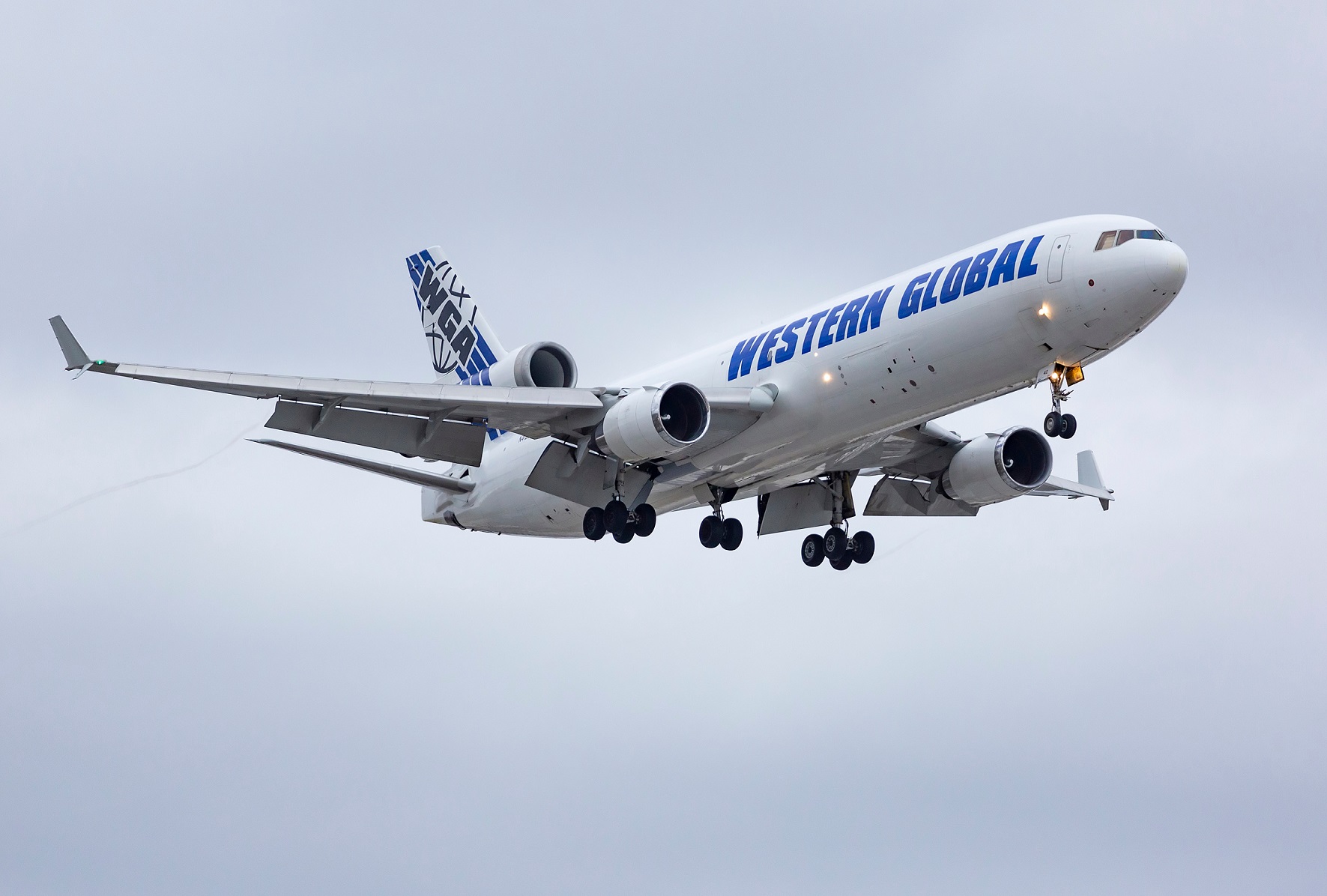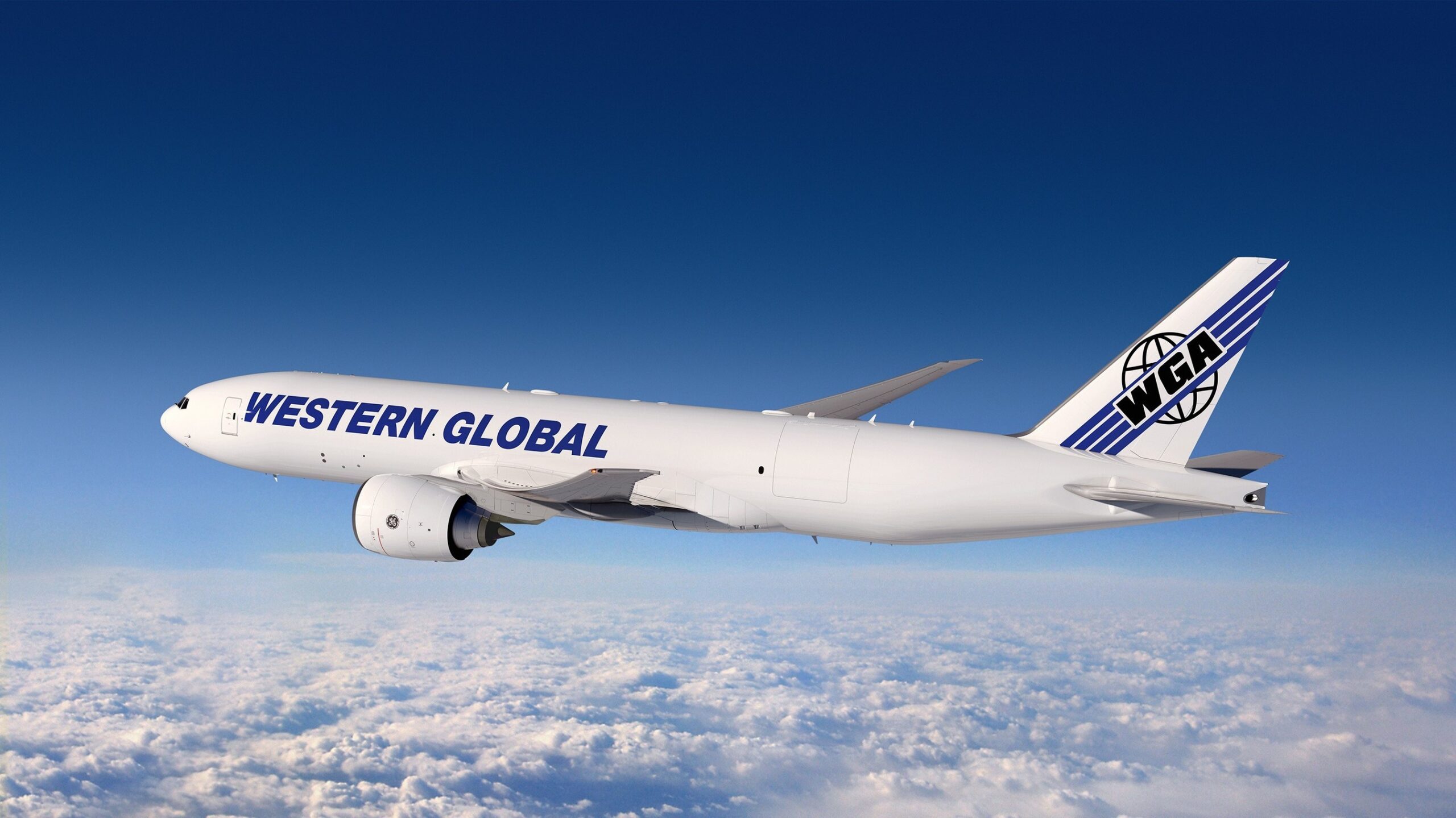Where did things go wrong for Western Global Airlines?
06 / 09 / 2023

Source: Carlos Yudica/Shutterstock
In 2020 and 2021 Western Global was preparing for a bright future with plans to add new modern freighters on the back of high demand for all-cargo aircraft. By July this year the airline had filed for Chapter 11 bankruptcy protection. So where did things go wrong for the carrier?
In the summer of 2021 freighter operator Western Global Airlines (WGA) was flying high.
Ongoing Covid restrictions meant that passenger bellyhold operations were only slowly getting underway and freighter operators had been in high demand for more than a year.
And the demand for freighters was expected to last.
Many in the industry were predicting that all-cargo aircraft would remain in high demand as a long-term structural shift pushed shippers and forwarders away from the uncertainty of belly capacity to the continuity that freighter services could offer.
Entrepreneurial WGA was looking to capitalise on the situation and in September 2021 the carrier applied to the US Department of Transportation (DoT) to remove restrictions limiting the size of its fleet.
The company was first certificated in 2014 and had grown its fleet rapidly since then, applying several times to have fleet limitations — put in place for new carriers — increased.
In 2021, however, the carrier decided the time was right to apply to have the limitations removed completely.
“Given that Western Global has been operating very successfully for seven years and meets or exceeds all fitness criteria, the company submits that a condition limiting its fleet size is no longer necessary,” the company said in its application.
At the time, the airline’s operational fleet stood at 12 MD-11Fs and three B747Fs.
With restrictions lifted by the end of the year, the carrier next looked to expand its fleet.
In February 2022, Boeing announced that WGA had placed an order for two Boeing 777 freighters with an additional purchase option.

Western Global 777 Freighter. Copyright: Boeing
“As the world’s fastest-growing cargo airline, we have determined that augmenting our existing fleet with new 777 Freighters will enable us to best serve our customers while providing a clear path to our future fleet plans,” said Jim Neff, WGA chief executive officer and founder at the time the deal was announced.
The optimism was backed up by financial performance over the Covid years.
WGA revenues stood at $373m in 2020, $386m in 2021 and $427m in 2022. Operating earnings – although they declined over the three years – stood at $197m in 2020, $179m in 2021 and $100m in 2022.
To provide some context, in 2018, another solid year for air cargo, the carrier reported revenues of $252m and operating earnings were $107m.
The carrier’s fleet had also grown, with WGA’s website stating that it operated a fleet of 19 MD-11 and 747-400 freighters.
However, as 2022 progressed, storm clouds were gathering.
The wider air cargo market began to turn, having a huge impact on WGA and eventually leading to the company filing for Chapter 11 bankruptcy protection.
In court documents seen by Air Cargo News, co-chief restructuring officer Roberto Del Genio says that from late 2022 WGA was severely affected by an “unprecedented and unforeseen combination of negative macroeconomic and industry factors”.
These challenges included a sharp decline in international trade, a substantial decrease in exports from China, high fuel prices, the return of lower deck capacity on passenger airlines, pilot and mechanic attrition, and customer contract cancellations due to softening demand in the air cargo industry.
WGA said it could not compete with major passenger airlines in terms of recruitment during this “unprecedented” hiring spree.
As a result, Western Global lost numerous pilots during 2022 and 2023 and has only been able to replace some of those that went.
“The high levels of pilot and mechanic attrition have prevented Western Global from taking advantage of certain revenue-generating opportunities and also significantly increased costs related to the payment of overtime and the need to recruit and train new pilots,” the court documents read.
Del Genio says that WGA was particularly harmed by these events because three of its major international customers were forced to suspend their long-term contracts with the company in late 2022 and early 2023 due to the unanticipated resurgence of Covid-19 in China which caused them to lose customers.
“These unforeseen factors have caused Western Global’s liquidity to decrease to unsustainable levels and Western Global now finds itself unable to satisfy its debt obligations and key operating expenses,” Del Genio says.
While some customers have since resumed flying, volumes have not recovered to pre-pandemic levels and those companies asked for lower rates that would cause the airline to fly at a loss.
The airline had made large capital investments to support these long-term contracts, according to the court documents.
Del Genio adds that during the pandemic, the company was affected by a “significant increase” in costs.
In particular, during the pandemic, WGA was regularly responsible for paying its crews hazard pay and overtime pay, the cost of parts and maintenance increased, and closures of borders and airports across the world required flights to be rerouted with costly extra stops.
“In addition, since Western Global’s focus during this time was on long-term contracts with its customers, the company did not benefit from the increased spot rates during the pandemic as much as certain other air cargo operators,” says Del Genio.
He says that many costs escalated further after Covid due to rising inflation that followed the pandemic, the impact of the Russia-Ukraine conflict on fuel prices, and the labour poaching from passenger airlines and other cargo airlines.
WGA also points out that costs increased due to the longer flying distances due to Russian airspace ban.
Meanwhile, the company also faces a lawsuit brought by three employees who feel that an Employee Stock Ownership Plan (ESOP) had bought overpriced shares in the company in a deal that saddled the company with debt.
They say that to finance the $510m share purchase form Neff and partners, the ESOP borrowed from the airline, which itself raised the money to lend to the scheme in part through the issue of more than $400m in junk bonds.
The employees say the debt costs more than $40m per year to service at an interest rate of around 10%.
In response, WGA says the ESOP also included ownership in two affiliated aircraft leasing companies, that the ESOP was created through “extensive due diligence”, that there are no WGA shares in employees 401(k) accounts, that shares were granted to ESOP participants at “no out-of-pocket costs” and that the litigation relates to a putative class action lawsuit that was commenced by two pilots shortly after the ESOP was established.
The aircraft leasing company included in the programme transferred its aircraft to the airline as part of creating and funding the ESOP.
According to FreightWaves, The ESOP scheme is being contested by the Department of Labor (DOL) over the value of the stock purchased by the scheme and a conflict of interests.
Ratings downgrade
Earlier this year, the airline had its credit ratings lowered by both Moody’s and Fitch, providing more insight on what happened at the carrier.
At the time of the downgrade, Fitch said the airline’s problems stemmed from a weakening liquidity position and an ongoing downturn in air cargo.
“WGA’s liquidity is constrained due to a fully drawn revolver and weak free cash flow (FCF) profile,” Fitch wrote back in May.
“WGA’s operations remained limited as of April 2023 despite Asia’s post-Covid and Chinese New Year reopening.
“Fitch believes the dedicated air cargo market will remain pressured as demand softens from slow economic growth and elevated inflation while the supply of bellyhold capacity in passenger planes gradually returns.
“WGA has experienced challenges in its ability to attract and retain pilots.”
Fitch said that following bankruptcy, it was likely that the airline would shrink its fleet size to improve efficiency, given the advanced age of the fleet – 15 out of WGA’s 21 aircraft are above 25 years old.
In its ratings downgrade, Moody’s said that it expected the $47.5m revolving credit facility to remain fully utilised even after the receives back the deposits for its aborted agreement to purchase two 777 freighters.
“Furthermore, all of Western Global’s assets are encumbered, limiting its ability to raise new funding on favorable terms.
“Additionally, declining operating block hours in recent quarters have contributed to weakness in Western Global’s revenues and cash flow.”
The agency said that by September 30 last year, the airline had a negative cash flow of $52m, including a $13m deposit to purchase the two 777Fs.
Meanwhile, in the second quarter, fuel expenses increased because the company was unable to transport cargo on its westbound routes to Asia due to it not meeting minimum requirements for the number of pilots operating the aircraft.
Moody’s added: “The ratings also reflect Western Global’s modest scale, aged fleet composition, high customer concentration (top three customers were 64% of total revenue as of 30 September 2022) and negative tangible equity.”
Hope for the future
But all is not lost for the carrier and Western is hopeful that it could emerge from Chapter 11.
With the company facing up to these issues, WGA this year began negotiating with lenders, refinancing, potential investors and find potential buyers of aircraft and other assets.
In July, the airline’s founder and chief executive Jim Neff purchased $115m of outstanding senior secured debt for $45m to help improve the company’s lending conditions.
Then, in August, the airline announced it would file for Chapter 11 Bankruptcy while also implementing a re-organisation.
“Once the reorganisation is implemented, it will materially reduce the company’s debt by over $450m, infuse significant new capital into the company, and give the reorganised WGA the ability to continue its commitment to sharing the economic benefits of ownership with employees,” WGA said.
“The restructuring support agreement (RSA) achieves many of the goals WGA sought from the outset of its restructuring efforts, including deleveraging the balance sheet by 86% and partnering with new investors.”
The agreement sees the company enter Chapter 11 with more than $77m of financing from founder Jim Neff and bondholder investors.













